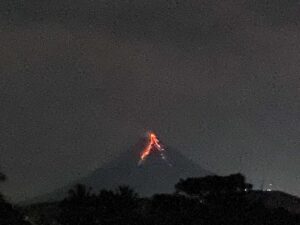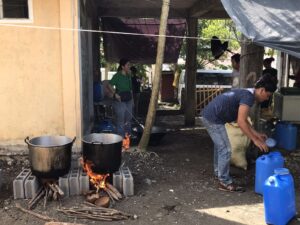Mayon Volcano
Situation Report #3
July 5, 2023
5:00 pm
Situation Overview
As of July 3, 2023, Alert Level 3 remained elevated over Mayon Volcano which indicates that there is currently a high level of unrest due to the presence of magma at the crater, and the possibility of a dangerous eruption in the next days or weeks according to state seismologists. In the previous 24 hours, Mayon Volcano had 397 rock falls events, four volcanic earthquakes, and two pyroclastic density currents (PDCs) in a report published by the Phivolcs.
Phivolcs reminded people who live close to the volcano that its instability could result in a variety of disasters, including rockfalls, landslides, avalanches, ballistic fragments, lava flows, and moderate-sized explosions.

Additionally, in the latest monitoring of the Phivolcs, they noted 257 rockfall events, six dome-collapse pyroclastic density currents (PDC) lasting three minutes each, one front lava collapse PDC that produced a 300-meter-high light brown plume, and one volcanic earthquake. Meanwhile, due to the ongoing unrest of the volcano, the local government of Albay is asking the national authorities for assistance since it has run out of funds to meet the needs of thousands of Mayon evacuees.
Water supply and sanitation are deemed to be the utmost needs, especially in evacuation centers. Moreover, the affected families, particularly the farming households, are in need of immediate economic assistance due to the disruption of their vulnerable livelihoods.
Source: National Disaster Risks Reduction Management Council, DSWD Dromic, Inquirer
Affected Populations
Due to increased volcanic activity in Mayon, the number of residents being evacuated to ensure their safety remains high. Significant volcanic activity has prompted authorities to extend evacuation warnings surrounding the Mayon volcano. The Albay authorities have issued evacuation orders for residents who live inside the 6 km (4 miles) Permanent Danger Zone (PDZ).
As per the National Disaster Risk Reduction and Management Council (NDRRMC), 9,776 families have been affected, or 37,944 individuals. Of the number, 5,768 families or 20,144 individuals are displaced — 5,360 families or 18,717 individuals in 28 evacuation centers and 408 families or 1,420 individuals staying with relatives or friends. Meanwhile, According to DSWD’s latest report, as of July 5, a total of 5,379 families or 18,792 individuals are currently seeking refuge in 28 evacuation centers in 7 municipalities in Albay province. Operations at local and nearby airports and seaports remain unaffected.
Source: National Disaster Risks Reduction Management Council, DSWD Dromic, Inquirer
Emergency Response Efforts
1. CDRC and its regional partner continues to monitor the situation and issue situation reports.
2. Our regional partner Tarabang para sa Bicol, Inc. (TABI) convened an emergency meeting with its volunteers on 09 June 2023. TABI also began coordinating with the LGU – Albay Public Safety and Emergency Management Office (APSEMO) to assess the situation. TABI and its volunteers continue to identify the increasing demands and developing needs and capacities of the affected communities.

4. Psychosocial and art sessions were provided to particular groups of evacuees as support to their mental, emotional, and moral state during their stay in the evacuation centers.
5. TABI and CDRC have opened a “Call for Donation” for the families affected by the volcanic eruption in Albay.
6. CDRC coordinates with emergent groups who have already started their initiatives to help the communities affected by the mandatory evacuation, with the aim of strengthening these survivor and community-led responses (sclr) through the provision of microgrants.
7. Through the sclr project, CDRC awarded a microgrant to Organisasyon ng mga Magsasaka ng Albay (OMA), a people’s organization in Albay. The grant was used to provide food assistance to at least 315 affected families due to Mayon volcano’s increased unrest.
8. With the help of Foundation for Philippine Progress, Inc. (FPP), TABI will distribute cookware sets to Disaster Preparedness Committees (DPCs) and people’s organizations (POs) conducting hot meals in the evacuation centers.
9. CDRC’s emergency response team will be deployed to assist its regional partner in addressing the immediate needs of the affected population.
10. CDRC’s sclr or damayan project staff will conduct appreciative inquiry in the area to look for and support the Mayon initiatives of emergent groups.
Resources Available
● Prepositioned goods at the CDRC warehouse
● Monetary and in-kind donations
Expressed Needs
1. Immediate needs of the affected individuals include food, drinking water, face masks (KN95), and hygiene kits including women and girls’ essentials.
2. Bathroom essentials (pail/bucket and dipper) for the families staying inside the evacuation centers.
Coordination
Regional Partners
1. Tarabang para sa Bicol, Inc. (TABI)
2. Southern Tagalog People’s Response Center, Inc. (STPRC)
Partners
1. Foundation for Philippine Progress, Inc. (FPP)
2. National Alliance for Filipino Concerns (NAFCON)
Contacts
1. Cora Jazmines, Local Partnerships Department, lpd@cdrc-phil.com
2. Dom Ybera, Deputy Executive Director, dybera@gmail.com

